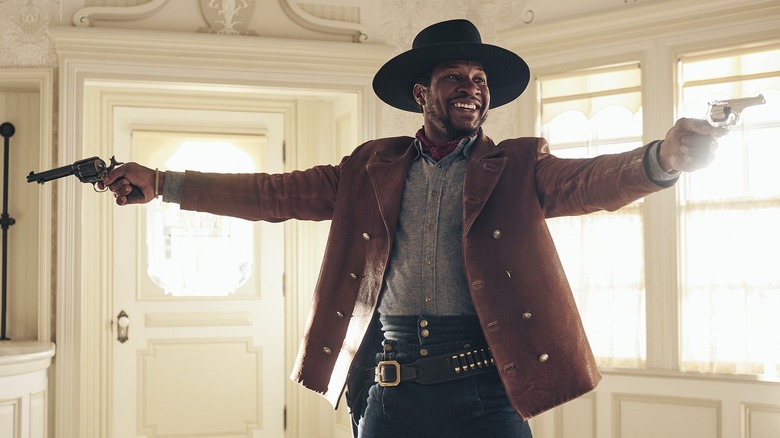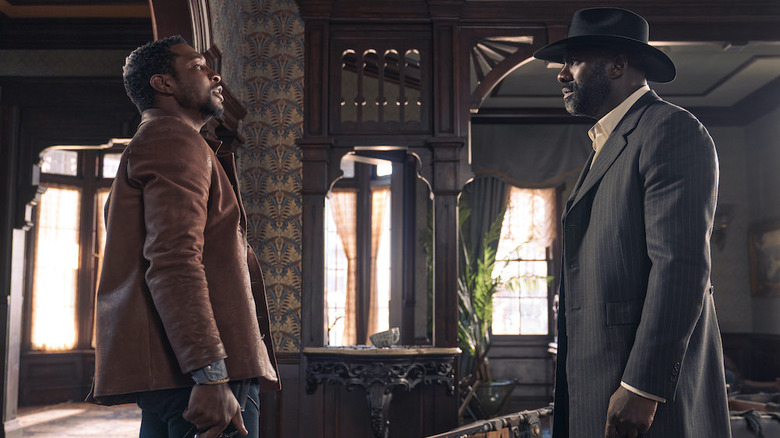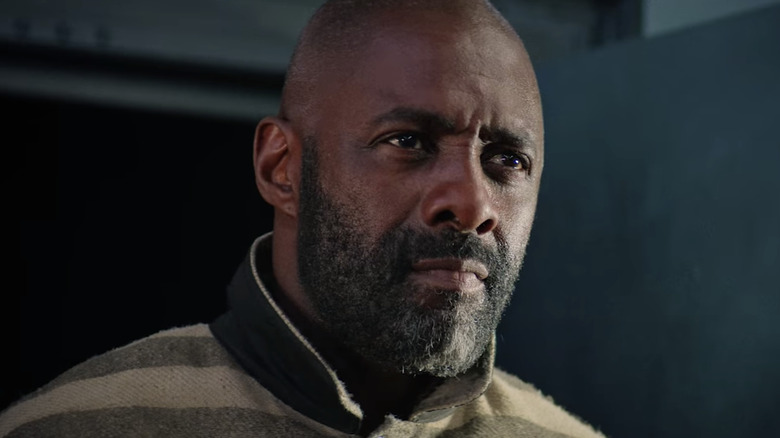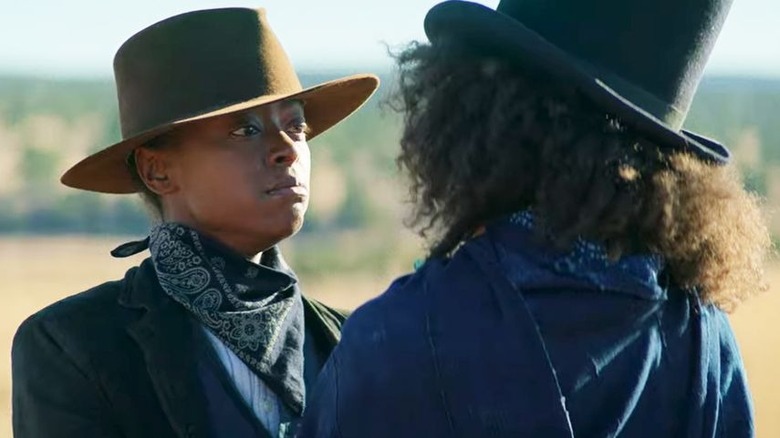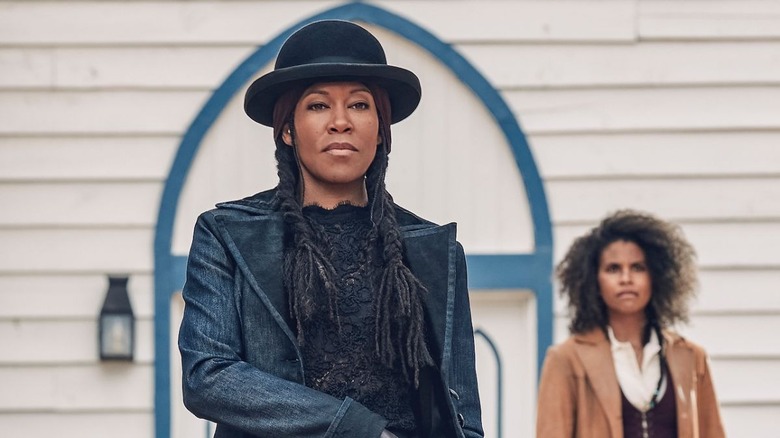The Harder They Fall Ending Explained: A Parable About Cycles Of Violence
Jeymes Samuel's "The Harder They Fall" debuted on Netflix, and the blaxploitation spaghetti Western is a colorful, brilliantly-acted blast. There's quite a bit going on, though, from the unique decision to use the names of real people while changing their stories, to a big third-act twist. By the time the credits roll, some viewers might be left scratching their heads. "The Harder They Fall" is the sequel to a short film and envisioned as a trilogy, and it's also a loving homage to 1970s movies with a decidedly modern twist, so it's no wonder a few folks will feel as if they were left in the dust by "The Harder They Fall."
In "The Harder They Fall," Nat Love (Jonathan Majors) has hunted down every last member of the gang that helped kill his parents, except for one: Rufus Buck (Idris Elba). When Buck is busted loose by his gang while being transported via train, Love rounds up his own gang to take down the notorious criminal. Not only did Buck kill his parents in front of him, but he scarred Love forever by carving a cross into his forehead. The need for revenge is understandable, to say the least. Once the bullets start flying, however, things get a little twisty.
Let's break down that third-act surprise, how all of those character arcs wrapped up, and dig into the ending of this inventive blast of a film.
Spoilers for "The Harder They Fall" after the cut.
'You're a Buck'
When Love finally gets the chance to face down the man who made him the murderer he is, Buck has a nasty little surprise for him. He starts telling Love about his own father, a brutal man who abused him before killing his mother and going on the run. When Love starts telling Buck that his own father was a good man, and didn't deserve to die for the sins of Buck's father, he reveals that they are one and the same. After Buck's father killed his mother, he went off and started a new family. He changed his last name to Love and had a son, Nat. That's why Buck came to kill the man after more than a decade, continuing the cycle of violence. It's also why he marked the cross on the boy's forehead: he couldn't kill his younger brother, but he wanted to make sure he recognized him.
He tells Nat that he's "a Buck," which the poor younger cowboy just doesn't want to hear. Not only does it make him tainted by the very villain he's sought to kill all of these years, but it dashes his memories of his father. His entire world gets turned upside down, and Buck asks Nat if he could really kill his older brother, when their motivations have been so similar. Nat shoots Buck and leaves him for dead, less interested in stopping the cycles of violence and more interested in a clean break with his past.
The Director's Personal Touch
It was important to Samuel that the film take a hard look at the cycles of violence suffered by the Black community. He even put a photo of his own father, who passed away when he was young, in the climactic scene:
"It was so tear-jerking and gripping. In Rufus Buck's mansion, there's a picture of a Black man on the wall just by the stairs. And when Rufus Buck is speaking to Nat Love, that picture is between them at times. That painting is of my father. So while they were talking about their father, all of us going through that scene and the crew looking at it on monitors all broke down in tears afterward. It was a really heavy scene to shoot."
He goes on to explain that Cherokee Bill's (Lakeith Stanfield) warning at the beginning of the film is meant for more than just the characters: "There's nothing but doom on this road."
Despite the fact that Samuel wants to break those cycles of violence, he felt that ending the film on a peaceful note wouldn't have worked for the character of Nat Love, because generational trauma is a tough thing to fight:
"I wanted to tell a story where the antagonist and the protagonist are essentially the same person doing the exact same thing. It's a never-ending loop of violence that we are sucked into, and I wanted to not preach but to shine a light on what happens all too often in our community. In order for me to pass commentary on my experience and the story that I wanted to tell, it had to end with a question and an answer. 'Is the devil dead?' 'I don't know.' Because you become what you kill. Nat Love can't hear the word 'Buck' as his last name. And then what do you do? This man killed [Nat's] parents — someone has to get murked. That's the only way it could have ended for me."
Cuffee, Bass Reeves, and Two Quick-Draw Shootouts
While Nat Love and his on-again, off-again love interest Stagecoach Mary (Zazie Beetz) get to ride off into the metaphorical sunset, we also get some closure for the rest of the gang. RJ Cyler's Jim Beckworth is dead, having run his mouth too much during a quick-draw contest with Cherokee Bill, but he is avenged by Cuffee (Danielle Deadwyler), who ends up having their own one-on-one with the notorious gunslinger. Cuffee ends up killing Cherokee Bill with a bullet through the neck, and they remark that Beckworth was faster, a final jab to make the revenge bittersweet.
Cuffee hides their assigned gender, behaving and dressing like a man. When they are forced to dress in a very femme gown and are asked about their "real" name, they reply "Cuffee is my name." It's a refreshingly honest portrayal of someone who fits outside of the gender binary in a period piece — something that's incredibly rare despite the fact that non-binary and trans people have existed as long as there have been people. Much like Samuel giving representation to Black folks from the old west, he gives Cuffee their due. Cuffee is based on the soldier Cathay Williams, who dressed as a man to fight against slavery in the Civil War.
The fictional Cathay/Cuffee gets their chance to do some good at the end of the film, when lawman Bass Reeves (Delroy Lindo) invites them to join the U.S. Marshals. They tell Reeves: "I always kinda wanted to be a deputy, sheriff, marshal person."
What About Treacherous Trudy?
When the smoke clears, the only other gang member left standing is Treacherous Trudy (Regina King), Rufus Buck's right-hand woman who is terrifying all on her own. In an incredibly talented ensemble cast, King still manages to steal every scene she's in, and if her monologue while peeling an apple doesn't earn her awards nods, it's a crime. She and Mary have a nasty battle in a barn, but we never seen her die the way we do the rest of Buck's gang. When Mary, Nat, Cuffee, and Bass Reeves leave town, the camera pans to a familiar hand holding Trudy's bowler hat, which means our heroes haven't seen the last of her.
If Samuel gets to make his sequels, Trudy could end up being the primary villain in the second and third installments. For now, it just feels like she's the series' boogeyman, and her impending return makes the ending a little less idyllic.
"The Harder They Fall" is streaming on Netflix.
